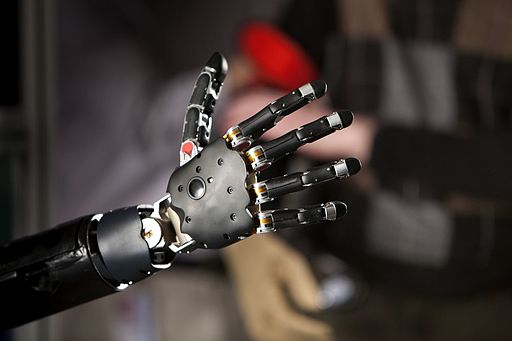Last week we kicked off a three-part mini-series on Technological Innovation and the Human Condition. The series is part of the ‘Scientists in Synagogues’ project run by my Rabbis Without Borders colleague, Geoff Mitelman. In each of the sessions, we have a congregant with expertise in some aspect of technological innovation or the impact of technology in our lives who presents on a topic. This is followed by small group conversations around tables, with supplementary Jewish texts and questions to help guide the discussion around the issues and ideas raised by the presentation.
In our first program, Mitch Diamond, a member who has worked with chip technologies (currently with Intel), had us consider what some of the underlying human impulses are that lead us to adopt or not adopt new technologies, and how we emotionally respond to the concept of new technologies taking over or transforming areas of our lives. Providing a context for how we tend to react to new technologies, whose impact we do not yet know and don’t generally do very well trying to predict, he introduced some wonderful historical examples. The debates we have about the impact of technology today are not, it turns out, anything new. Take this example from 1876, recorded in the New York Times:
“A patriotic regard for the success of our approaching Centennial celebration renders it necessary to warn the managers of the Philadelphia Exhibition that the telephone may really be a device of the enemies of the Republic.” What if every town in America got a phone, and never had to show up to celebrations like the Centennial in person again?
Today, many congregations have introduced live streaming technology into their sanctuaries. The result has not been, as some have feared, that people stop coming to the congregation. Rather, it has enabled those who otherwise could not access the spiritual experience, or who might not have chosen to access the experience by walking into a synagogue by themselves, to have a version of the experience.
We pondered whether a programmed robotic arm that can write a Torah scroll (a project that was brought to the Jewish museum in Berlin, albeit using paper and not parchment) could feasibly replace the art of the Sofer (the scribe). While most in attendance were clearly not in favor of such a development, articulating that it was about the intention, the spiritual meaning of the Torah and the craft involved in creating it, and how that was qualitatively different from the debate of the Fifteenth century when the printing press put thousands of scribes out of work, was not so easy.
Among some of the factors that surfaced in the conversations that followed the presentation were issues of genuine relationship and empathy. While in Japan, some have paid for a robot to perform funeral rites because the traditional priests are not plentiful enough and very expensive, most could not conceive of a Jewish funeral performed by a robot. The pre-funeral conversation and pastoral support provided by the rabbi were the qualitative parts of the experience that went beyond the functional. Likewise, doctors in our midst pointed to the human element that was essential to the doctor-patient relationship, even while recognizing that new technologies are helpful tools in making their diagnoses more accurate and enabling ever-more technical and fine detail procedures to be carried out that the human hand alone would not be capable of.
Discussing where technology and AI (artificial intelligence) can aid knowledge and where it can harm human understanding, we reflected on how, far too often, people will be uncritically accepting of information they read online (the ‘Google Effect’). Wisdom is the result of reading more broadly, and we tend to find information more efficiently in the high-tech age, but lose the incidental learning that happens when pouring over journals in a library as part of a research process. We are more likely to focus in on the information that fits with our pre-ordained assumptions and miss those ideas that are at variance with those opinions.
Interestingly, when the printing press was first introduced, many Christian clergy were against it because they were concerned about the democratization of knowledge if lay people could read scripture for themselves. However, while much of Jewish leadership was enthusiastic about the possibilities of this new technology, some of those who were against it had a different reason than the Christian clergy.
Magda Teter writes: ‘Like their Christian counterparts, some rabbis expressed strong reservations about the dissemination of knowledge through printing. They feared that Halakhah and Kabbalah, unfiltered by rabbinic instruction, would be misunderstood if made widely accessible. Some also feared that Halakhah would become overly rigidified because it would not be mediated by the discussion and debate that accompanied its creation and transmission in rabbinic circles.’ (source – http://jewishhistory.research.wesleyan.edu/ii-cultural-trends/1-printing/)
In other words, it was the relational experience of chavruta (study partners) in the yeshiva, where Jewish practice and law evolves through debate and group learning, that these rabbis feared would be lost if people read alone out of printed volumes, and this might overly rigidify the evolution of Judaism. Again, it is the relational aspect of the experience – that which is qualitatively about the connections between human and human – that were integral to the assessment of whether a technological innovation would bring about something positive or negative.
Ultimately, our reflections demonstrated that technology is neither a positive or a negative in its own right. We began to surface some of the practical, but more often emotional and spiritual aspects of connection that play a part in determining whether, when it comes to technological innovation, we truly want it. There may, in fact, be some things in life that are irreplaceable.



